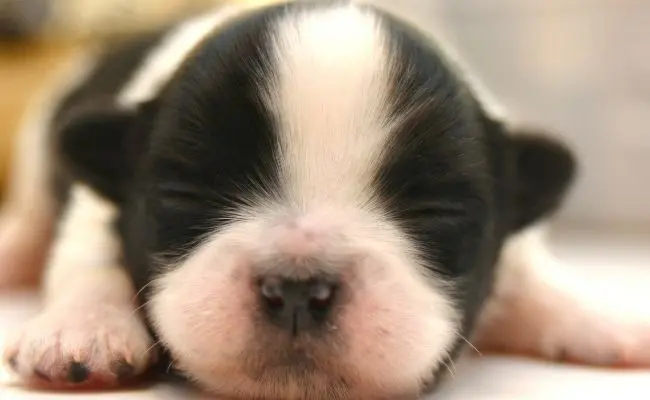A puppy’s first eight weeks

The first eight weeks of a new pup’s life is jam-packed full of so many new things – in fact, over these first few weeks they will grow and change at a faster rate than at any other time in their lives. To help follow their progress, here’s our week by week guide to a puppy’s development, from complete reliance on their mum to playful, inquisitive and independent puppies ready for the next stage of their lives in a loving home.
Week One of a puppy’s life – feed, sleep, repeat
As puppies are born unable to see, hear or regulate their body temperature, they are reliant on their mum for all their needs and a place to snuggle into for warmth. During this first week, all their energy will be devoted to sleeping and feeding so that they gain weight and become strong.
It’s a busy time for human helpers with sleepless nights on the cards to ensure that puppies and mums want for nothing. At Dogs for Good, we’re lucky enough to have a dedicated team of volunteers who look after our own breeding stock (aka ‘puppy mums’) and their pups under the expert guidance of Becci Hodge, our Breeding Stock Co-Ordinator.
Week Two of a puppy’s life – Ears, eyes, nose and toes!
Around halfway through a puppy’s second week of life, his or her eyes will start to open and while things will be a bit fuzzy, their sight will soon improve helping them to see the world around them. Around now a puppy’s hearing will start to improve – so far they have only been able to sense vibrations – they’ll be able to hear clearly by 2 ½ to three weeks of age.
Their front legs will now be able to support their weight making it easier to seek out their mum … and the next milk feed! At around seven days onwards, the pink nose colour that dogs such as yellow Labradors and golden retrievers are born with will begin to develop the darker pigmentation they have in later life.
Week Three of a puppy’s life – Playing, teething and weaning
Week three sees strengthening of both front and back legs and puppies at this stage are now able to fully support their own body. This means they’re able to explore their world and play begins in earnest! They’ll start by playing and investigating with their brothers and sisters and will be less reliant on their mum; no longer needing to seek her out to keep warm. In addition, this is the week where their sharp little puppy teeth start to appear which also means that it’s time to start weaning.
Weeks Four and Five of a puppy’s life – New things, new people, new experiences
With all their senses now fully developed, puppies of this age will continue to learn through play. In addition, this is also a great time to start socialising them – introducing them to new things – such as people and sounds and getting used to being gently handled. This builds confidence and familiarity with experiences they’ll come across later in their life. It’s really important that periods of socialisation are appropriate to the age of the pup, are kept short and sweet and remain positive, so that the puppy remains confident rather than getting frightened or overwhelmed.
Weeks Six to Eight of a puppy’s life– Learning, leaving and loving life
They are growing physically stronger and more coordinated and will engage in more play with their litter mates. Play is incredibly important part of their development, these interactions help them both physically develop and are their first opportunities to interact with other dogs.
At this stage, they are nearly fully weaned and get most of their nutrients from their food and require less milk from their mum. Mum may now be able to take some rest away from her puppies although she will still be able to provide an important role in shaping positive interactions with other dogs and grow their confidence with new experiences.
Puppies at this age are still keen to explore their world but from six weeks are already becoming more reserved about new experiences so it’s really important to support them and their exposure to new things appropriately.
Eight weeks and beyond …
Obviously, exposure to everything in life isn’t possible in these few weeks. By law, puppies can’t leave a breeder’s home until eight weeks of age and they must be microchipped. They’ll also need to have their vaccinations before they can really start to venture out into the wider world. The good news is that there are lots of ways to help to socialise a puppy in a safe home and garden environment so they can grow their confidence in a safe and managed environment that won’t be too overwhelming for them.
Up to 16 weeks old is a key period for puppies to learn new things and it’s really essential to keep new experiences short and positive during this time so that they build confidence as well as a great relationship with their new owner.
When does a Dogs for Good puppy begin being socialised?
Our pups are no different to other dogs, so at eight weeks old, Dogs for Good puppies leave their wonderful mums (who are mostly quite keen to see them on their way so they can get some hard- earned rest) and go to live with one of our volunteer puppy socialisers who care for them for 14-16 months. These generous people open their hearts and homes and sacrifice slippers and sleep to ensure that our puppies are loved and cared for during the next chapter in their lives.
You can follow the progress of a Dogs for Good puppy in their journey to becoming an amazing assistance dog by sponsoring a puppy.
Help support our life-changing work...
Imagine if everyday tasks were so challenging or physically demanding they affected your quality of life. For many people living with a disability of families with a child with autism, that is their reality. Now imagine if a specially trained four-legged friend could restore your, or your family’s, independence.
The demand for our services is high and we can’t help as many people as we would like to without more funding. Please help us continue making life-changing differences for people with disabilities through the power of expertly trained dogs.
Every contribution, whatever size, is important and helps us make a difference.

